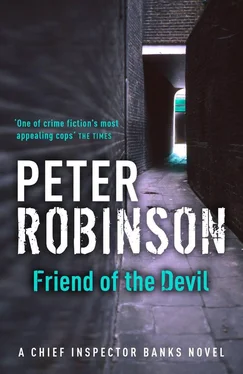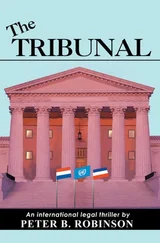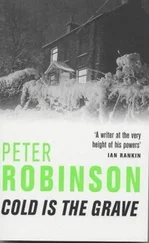Annie parked in Eastvale market square rather than behind the police station. It was a bit of a walk down King Street to the infirmary, but the fresh air would do her good. Afterward, she would call in at the station and see how everyone was recovering after last night’s wake. Annie felt quite proud of herself for drinking only one pint over the course of the evening, then driving back to Whitby.
Reception told Annie that Dr. Wallace was in her office in the basement. Annie didn’t like Eastvale General Infirmary, especially the basement. The corridors were high and dark with old green tiles, and footsteps echoed. The whole place was a Victorian Gothic monstrosity, and even though the mortuary and the postmortem theater had been modernized with the best equipment, the surroundings felt antiquated to Annie, associated with the barbaric times of no anesthetics and unhygienic conditions. She shivered as her shoes clicked along the tiled corridor. The other thing about the basement that gave her the creeps was that there was hardly ever anyone around. She didn’t know what else was down there other than storage and the mortuary. Maybe the bin where they dumped all the amputated limbs and extracted organs, for all she knew.
Dr. Wallace was actually in the postmortem theater, sitting at the long lab table mixing some chemicals over a Bunsen burner when Annie entered. There was a body on the table. The Y incision had already been made and the internal organs were all on display. The raw-lamb smell of dead human flesh hung in the air, mixed with disinfectant and formaldehyde. Annie felt slightly nauseated.
“Sorry,” said Dr. Wallace, with a weak smile. “I was just finishing up when I got sidetracked by this test. Wendy had to leave early — boyfriend trouble — or she’d have done it for me.”
Annie glanced at the body. She could relate to boyfriend trouble. “Right,” she said. “Just a few questions, as I mentioned.”
“I’ll get him closed up while we talk, if that’s all right. Does it bother you? You seem a bit pale.”
“I’m fine.”
Dr. Wallace gave her an amused glance. “So what burning questions bring you all the way down to my little lair?”
“It’s what we were talking about last night. Lucy Payne and Kevin Templeton.”
“I don’t see how I can help you. Lucy Payne wasn’t my case. We agreed there were similarities, but that’s all.”
“It’s not so much that,” Annie said, settling on a high swivel stool by the lab bench. “Not specifically, at any rate.”
“Oh? What, then? I’m curious.” Dr. Wallace unceremoniously dumped the organs back into the chest cavity and prepared the large needle and heavy thread.
“You went to university with the lawyer, Julia Ford. You’re still friends. Right?”
“That’s true,” said Dr. Wallace. “Julia and I have known each other a long time. We’re practically neighbors, and we play the occasional round of golf together.”
“What did you do before then?” Annie asked.
“Before playing golf?”
Annie laughed. “No, before going to medical school. You were a mature student, weren’t you?”
“I wouldn’t say I was all that mature, but I’d lived an interesting life.”
“Did you travel?”
“For a few years.”
“Where to?”
“All over. The Far East. America. South Africa. I’d get some low-paying job and support myself for a while, then move on.”
“And before that?”
“What does it matter?”
“I don’t suppose it does. Not if you don’t want to talk about it.”
“I don’t.” Dr. Wallace looked at Annie. “I had a disturbing phone call from an old friend of mine at university just an hour or two ago,” she said. “She wanted to let me know that there had been a Detective Constable Helen Baker ringing up and asking questions about me. Is that true?”
“Quite the grapevine,” said Annie.
“Is it true?”
“Okay. Look, this is a bit delicate,” Annie said, “but Julia Ford was one of the few people who knew the true identity of the woman in Mapston Hall. Lucy Payne. Her firm made the arrangements to place her there, took care of all her affairs. As I just said, we know the two of you went to university together, that you’re neighbors and friends. Did you know anything about this arrangement?”
Dr. Wallace turned back to her corpse. “No,” she said. “Why should I?”
Annie felt that she could sense a lie, or at least an evasion. There was something about the pitch of Dr. Wallace’s voice that wasn’t quite right. “I was just wondering if, you know, during the course of an evening, she might have let something slip, and that you might have done the same.”
Dr. Wallace paused in her sewing and turned to Annie. “Are you suggesting,” she said, “that Julia would break a professional confidence? Or that I would?”
“These things happen,” said Annie. “A couple of drinks. No big deal. Not the end of the world.”
“‘Not the end of the world.’ What an odd phrase to use. No, I don’t suppose it would be the end of the world.” She went back to sewing dead flesh. Annie could feel the tension rising in the room, as if the very air itself were thinning and stretching. She also felt even more nauseated by the smell.
“Well, did she?” she pressed on.
Dr. Wallace didn’t look up. “Did she what?”
“Tell you about the arrangements her firm had made for Lucy Payne?”
“What does it matter if she did?”
“Well,” said Annie. “It means… I mean… that someone else knew.”
“So?”
“Did she tell you?”
“She might have done.”
“And did you tell Maggie Forrest, for example? Or Dr. Susan Simms?”
Dr. Wallace seemed surprised. “No. Of course not. I vaguely know Susan Simms as a fellow professional, and from the occasional court appearance, but we’re hardly in the same field. I don’t know any Maggie Forrest.”
“She was the neighbor who befriended Lucy Payne and almost died at her hand.”
“More fool her. But wasn’t that a long time ago?”
“Six years. But Maggie’s disturbed. She had a strong motive for wanting Lucy dead, and no alibi. All we’re trying to find out now is whether she—”
“Knew that Karen Drew was Lucy Payne. Yes, I know where you’re going with this.”
“Karen Drew?”
“What?”
“You said Karen Drew. How did you know that?”
“I suppose I read it in the paper after the body was found, like everyone else.”
“Right,” said Annie. It was possible, of course. The body had been identified as Karen Drew’s, but she would have thought that subsequent discoveries and all the publicity given to the Chameleon case and the “House of Payne” had driven that minor detail from most people’s minds. Maggie Forrest had said she didn’t recognize Karen Drew’s name, only Lucy’s. In the eyes of the world, Annie had thought, the dead woman in the wheelchair was Lucy Payne. Clearly not.
“I’m sorry, but I can’t help you,” Dr. Wallace said.
“Can’t or won’t?”
Dr. Wallace paused in her sewing and glanced over the body at Annie. “Well, it amounts to the same thing, really, doesn’t it?”
“No, it doesn’t. Either you don’t know anything, or you’re being willfully obstructive, which I find very odd behavior in a Home Office pathologist. You’re supposed to be on our side, you know.”
Dr. Wallace stared at Annie. “What are you saying?”
“I’m asking you if you gave anyone this information, for any reason.” Annie softened her tone. “Look, Liz,” she said. “You might have had good intentions. Perhaps you knew one of the victims’ families, or someone who had been damaged by the Paynes? I can understand that. But we need to know. Did you tell anyone about Lucy Payne being registered at Mapston Hall under the name Karen Drew?”
Читать дальше












